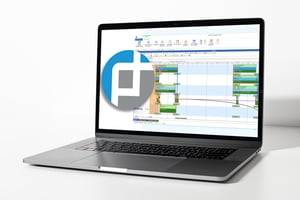Continuous Improvement Strategies in Scheduling
Every delay, hiccup, or bottleneck in the production line can lead to significant setbacks in meeting customer demands, affecting profitability and reputation. As a Purchasing Manager, your role is pivotal in ensuring that the supply chain flows seamlessly and that resources are optimally utilized.
In this blog, we look into the realm of continuous improvement strategies in scheduling, focusing on how integration between advanced planning and scheduling (APS) software like PlanetTogether and leading Enterprise Resource Planning (ERP), Supply Chain Management (SCM), and Manufacturing Execution Systems (MES) can revolutionize operations.

Understanding the Challenges
Electronics manufacturing is characterized by its fast-paced environment, stringent quality standards, and ever-evolving market demands. This complexity introduces a myriad of challenges in scheduling, including:
Demand Variability: Fluctuations in customer demand due to market trends, seasonality, or unforeseen events can disrupt production planning and scheduling.
Resource Constraints: Limited availability of resources such as manpower, machinery, and materials can pose significant scheduling constraints.
Production Complexity: The intricate nature of electronic products often involves multiple processes, stages, and dependencies, making scheduling a daunting task.
Lead Time Pressures: Shortening product life cycles and the need for quick time-to-market intensify the pressure to streamline scheduling and reduce lead times.
Synchronization Across Systems: Disparate systems and siloed data between ERP, SCM, MES, and scheduling tools can lead to inefficiencies, errors, and miscommunication.

Continuous Improvement Strategies
To address these challenges effectively, electronics manufacturers must adopt proactive continuous improvement strategies in scheduling. Here are some key approaches:
Advanced Planning and Scheduling (APS) Software: Implementing robust APS software like PlanetTogether empowers manufacturers to optimize production scheduling by considering various constraints, resources, and objectives simultaneously. PlanetTogether's AI-driven algorithms enable dynamic scheduling adjustments in real-time, ensuring maximum efficiency and responsiveness to changes.
Integration with ERP, SCM, and MES Systems: Seamless integration between APS and other enterprise systems such as SAP, Oracle, Microsoft Dynamics, Kinaxis, and Aveva MES is essential for holistic visibility and control over the entire manufacturing process. By synchronizing data and workflows across these systems, Purchasing Managers can make informed decisions, minimize disruptions, and enhance collaboration between departments.
Data-Driven Decision Making: Leveraging data analytics and business intelligence tools, such as dashboards and reporting functionalities within APS and ERP systems, enables Purchasing Managers to gain valuable insights into production performance, demand forecasts, resource utilization, and bottlenecks. By analyzing historical data and trends, organizations can optimize scheduling parameters, allocate resources efficiently, and anticipate future demand fluctuations.
Continuous Process Optimization: Embracing a culture of continuous improvement is essential for driving efficiency and agility in scheduling. Regularly review and refine scheduling processes, identify bottlenecks, and implement corrective actions to enhance productivity and responsiveness. Encourage cross-functional collaboration and feedback loops to ensure that scheduling strategies align with organizational goals and market dynamics.
Employee Empowerment and Training: Invest in training programs and skill development initiatives for employees involved in scheduling and production planning. Equip them with the necessary tools, knowledge, and autonomy to make informed decisions, adapt to changing priorities, and troubleshoot scheduling challenges effectively. By fostering a culture of empowerment and continuous learning, organizations can unlock the full potential of their workforce and drive sustainable improvements in scheduling performance.
Supplier Collaboration and Visibility: Strengthen collaboration with key suppliers through integrated supply chain management solutions. Establish transparent communication channels, share forecast data, and collaborate on demand planning to minimize lead times, reduce inventory costs, and mitigate supply chain risks. By fostering strong partnerships with suppliers, electronics manufacturers can enhance agility and resilience in scheduling operations.

Integration with PlanetTogether
Now, let's explore how integration between PlanetTogether and leading ERP, SCM, and MES systems can supercharge scheduling capabilities:
Real-Time Data Synchronization: Integration enables seamless exchange of data between PlanetTogether and ERP/SCM/MES systems, ensuring that scheduling decisions are based on accurate, up-to-date information.
End-to-End Visibility: By integrating scheduling with other enterprise systems, Purchasing Managers gain comprehensive visibility into production orders, inventory levels, procurement status, and shop floor activities. This holistic view enables proactive decision-making and effective resource allocation.
Automated Workflows: Integration streamlines workflows by automating data transfer and synchronization between systems, reducing manual efforts and minimizing the risk of errors or discrepancies.
Optimized Resource Utilization: By aligning scheduling decisions with resource availability and capacity constraints from MES and ERP systems, PlanetTogether ensures optimal utilization of manpower, machinery, and materials.
Adaptive Planning and Dynamic Adjustments: Integration enables PlanetTogether to adaptively plan and dynamically adjust schedules in response to changing demand, supply chain disruptions, or production constraints detected by ERP and SCM systems.
Continuous improvement in scheduling is critical for electronics manufacturers to stay competitive in today's dynamic marketplace. By adopting advanced planning and scheduling techniques, integrating with leading ERP, SCM, and MES systems, and fostering a culture of innovation and collaboration, organizations can optimize resource utilization, minimize lead times, and enhance customer satisfaction.
As a Purchasing Manager, your role in driving these continuous improvement initiatives is pivotal in ensuring operational excellence and business success in the ever-evolving landscape of electronics manufacturing.
Are you ready to take your manufacturing operations to the next level? Contact us today to learn more about how PlanetTogether can help you achieve your goals and drive success in your industry.
Topics: PlanetTogether Software, Real-Time Data Synchronization, Integrating PlanetTogether, End-to-End Visibility, Continuous Improvement, Automated Workflows and Alerts, Optimized Resource Utilization, Adaptive Planning and Dynamic Adjustments, Electronics Manufacturing




















LEAVE A COMMENT